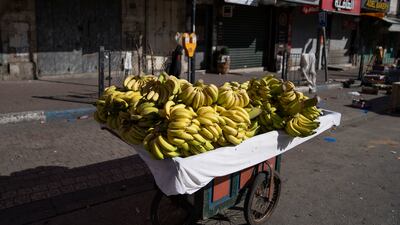Live updates: Follow the latest news on Israel-Gaza
The devastating effects of the Israel-Gaza war, which is now in its third month, has prompted the World Bank to reverse its 2023 forecast for the Palestinian economy to a 3.7 per cent contraction, from a growth projection of 3.2 per cent before the war.
The Palestinian economy has been at a "near-complete standstill" since the conflict broke out in October, raising the risk of a "lasting impact" on its future and heightened levels of poverty, the Washington-based body said in its monthly update.
The contraction would be equal to a drop of about $1.5 billion in nominal gross domestic product for 2023 alone, with the losses extending to household incomes, company profits and government taxes, it said.
This would erase all the welfare gains made in the Palestinian territories since the end of the Covid-19 pandemic.
The forecast adds to the burden faced by the Palestinian economy, which was already experiencing a slowdown.
In the first half of 2023, growth in the Palestinian territories slowed to 3 per cent annually, largely due to the waning post-pandemic recovery.
Gaza's economy alone has been experiencing a deep contraction, having shrunk by 4.4 per cent, year on year, in the first six months of 2023.
The enclave's economic contraction was attributed to a large decline in the agricultural, forestry and fishing sectors, a result of additional Israeli restrictions on the sale of Gazan products into the occupied West Bank since August 2022.
"The current crisis exacerbates pre-existing structural weaknesses, and efforts by the international community to address them have had limited success," the World Bank said.
The effects of the conflict on the Palestinian economy are consequential, according to the lender's preliminary estimates.
As of the second half of November, about 60 per cent of information and communications technology infrastructure, at least 60 per cent of health and education centres and 70 per cent of commerce-related infrastructure had been damaged or destroyed in Gaza.
Nearly half of all primary, secondary and tertiary roads are damaged or destroyed, and more than half a million people are homeless as a result of the conflict.
"The loss of life, speed and extent of damages to fixed assets and reduction in income flows across the Palestinian territories are unparalleled," the report said.
The devastation wrought by the Israel-Gaza war and the continued destruction of infrastructure in the narrow enclave means it will take years for Gaza and the broader Palestinian economy to recover.
The continued bombardment of Gaza has turned into a humanitarian crisis and the economic fallout of the siege and devastation is the worst the territory has experienced.
Meanwhile, Israel's economy is also feeling the effects of the war, and is expected to face “more severe consequences from logistical disruptions, business interruption, a reduced labour force, suspension of gas production at the Tamar gasfield, and lower investment”, S&P Global Ratings said last month.
The New York-based agency expects Israel's GDP to shrink by 5 per cent annually in the fourth quarter of 2023, bringing down full-year growth to 1.5 per cent. It forecasts growth at 0.5 per cent for 2024.
"This war will have lasting effects on the impacted populations in Israel, Gaza and the West Bank far beyond what can be captured in numbers alone. Similarly, it will have a lasting impact on the Palestinian economy," the World Bank said.
Gaza's private sector activity has been shaken, with production having shrunk by 84 per cent in October alone.
About 147,000 jobs have been lost while most of its 56,000 formal businesses have suspended operations, the report said, citing preliminary estimates from the Palestinian Central Bureau of Statistics.
Across Palestine, private sector establishments have posted losses of more than $713 million since the war began, which is equivalent to about $24 million a day, the statistics bureau said.
This excludes the loss of properties and fixed assets, which stood at more than $2.5 billion in the Gaza Strip alone, it added.
All these would exacerbate poverty levels in the Palestinian enclave, which have been already severe even before the conflict.
Unofficial estimates have revealed that about six in 10 Gazans were already poor before the conflict, with eight in 10 dependent on aid, according to the statistics bureau's Labour Force Survey.
"Declining incomes from job loss, dwindling trade, heightened restrictions and salary cuts are dampening growth by affecting consumption levels. The labour market impacts are – in short – making Palestinians poorer," the World Bank report said.
"Incomes suddenly dropped due to lack of employment, declining trade and private sector activity, increased restrictions on movement and temporary reductions in public salaries in the West Bank.
"Consequently, consumption – the only actual engine of the Palestinian economic rebound since the Covid-19 shock – is taking a deep hit."
A silver lining for the Palestinian economy is its banking sector, which, despite rising risks, remains resilient, being well-capitalised, the report said.
The Palestine Monetary Authority maintained key measures, including ensuring that banks are in a position to support the economy and avoiding the accumulation of excessive risks that could end up jeopardising financial stability.
"Digital financial services have also proved to be an effective way to channel financial support, cash and credit immediately to affected economic agents such as households, corporates and micro, small and medium enterprises," the World Bank said.


